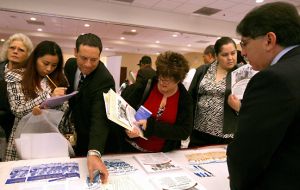MercoPress. South Atlantic News Agency
Several Fed members fearing inflation want a cap to the bond-buying program
 US unemployment stands at 7.8% and needs to add 90.000 jobs a month to keep up with population growth
US unemployment stands at 7.8% and needs to add 90.000 jobs a month to keep up with population growth A number of senior figures at the Federal Reserve want the US central bank to stop or slow down its bond-buying program “well before the end of 2013”. December minutes of its interest rate-setting Federal Open Market Committee (FOMC) showed that “several” of its twelve members made the call.
Their concerns are said to focus on the risk of higher inflation. The Federal Reserve is spending up to 85bn dollars a month on buying bonds.
After its December meeting, the FOMC announced that it would be purchasing both Treasury and mortgage bonds for an open-ended period.
This replaced an earlier bond-buying program called Operation Twist, which expired at the end of 2012, and spent up to the same amount each month. The aim of the bond-buying program is to keep down long-term borrowing costs in the US.
The released minutes said: “Several [officials] thought that it would probably be appropriate to slow or to stop purchases well before the end of 2013, citing concerns about financial stability or the size of the balance sheet.”
The Federal Reserve announced immediately following December's FOMC meeting that it would be keeping US interest rates near zero until the country's unemployment rate had fallen to 6.5%. It currently stands at 7.7%.
The US economy added a further 155.000 jobs in December, while the unemployment rate held steady at 7.8%, official figures show. The jobs came mainly in the healthcare, manufacturing, construction and food services sectors, reported the Labour Department.
The public sector shed 13,000 jobs, mainly at the local level, but this was more than offset by the private sector.
Separate figures suggested a sharp rise in activity in the US service sector. The Institute of Supply Management said its service index rose to 56.1 in December, from 54.7 the previous month. Any reading above 50 suggests expansion.
The December reading was the highest since February and was stronger than analysts had expected.
The total number of unemployed in the US in December was largely unchanged at 12.2 million. The unemployment rate for November was revised up from 7.7% to 7.8%, the department added.
These are the first figures since a short-term deal to stave off the US “fiscal cliff” was reached earlier last week. If a deal had not been agreed, spending cuts and tax rises worth 600bn would have kicked in. These could have thrown the US back into recession and sent the unemployment rate shooting upwards.
Still, the deal has only postponed by two months negotiations over spending cuts and the government debt ceiling - a legal cap on its total borrowing set by Congress. If this cap is not raised, the US is set to run out of money by February.
The December new jobs figure was only slightly above the average 153.000 jobs created per month in both 2012 and 2011. The US economy needs to add about 90,000 jobs a month to keep up with population growth.
Analysts expect many of the 30.000 new construction jobs - the sector's best performance in 15 months - to reflect rebuilding in the north-east of the US following the damage inflicted by Storm Sandy in October.
However, it may also reflect the bottoming-out of prices and activity in the US housing market following the collapse of last decade's property bubble. New home construction has typically played a leading role in the recovery following previous US recessions.
Last month, the US Federal Reserve said it planned to keep interest rates at close to zero at least until the US unemployment rate falls below 6.5%.
Interest rates in the US have been close to zero since December 2008, and the Fed again kept them at below 0.25% last month. It also continues to buy 85bn a month of government bonds and mortgage-backed securities to try to boost the economy.
The Fed said in December: “The committee remains concerned that, without sufficient policy accommodation, economic growth might not be strong enough to generate sustained improvement in labour market conditions.”




Top Comments
Disclaimer & comment rulesCommenting for this story is now closed.
If you have a Facebook account, become a fan and comment on our Facebook Page!